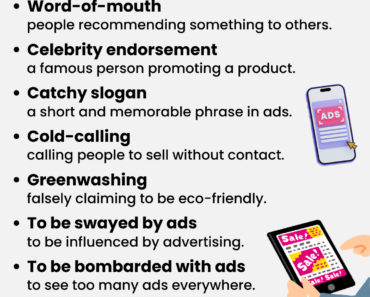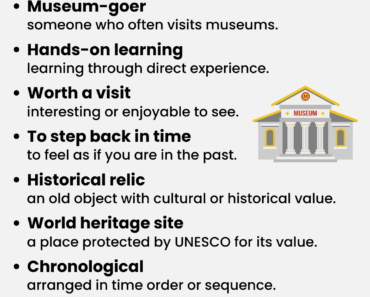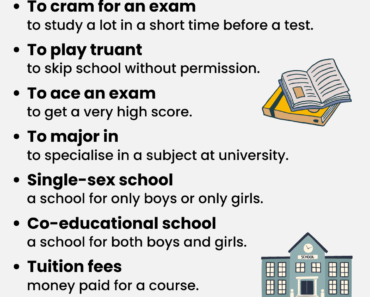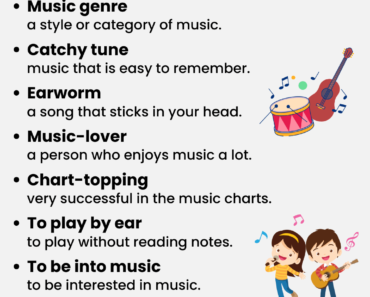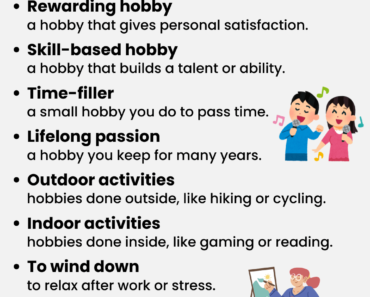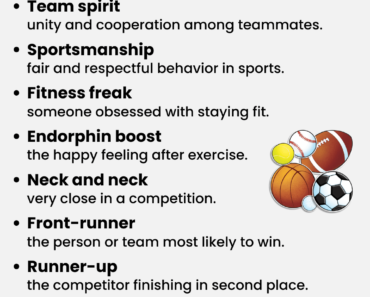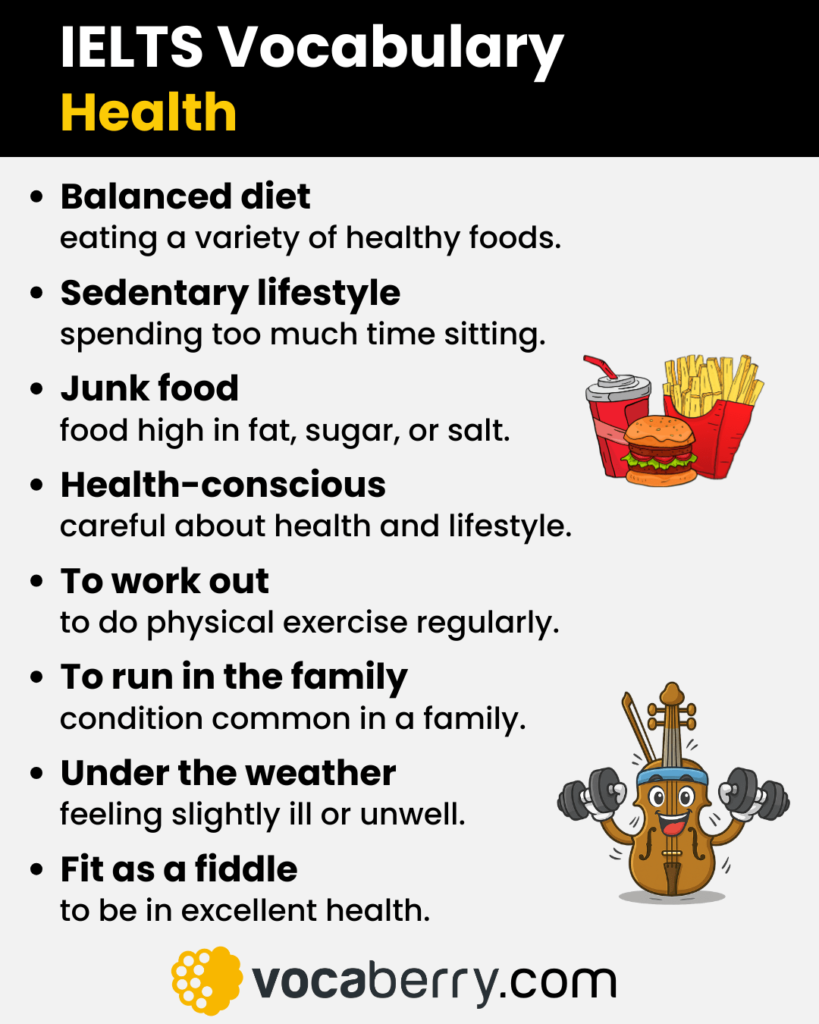
Health is another common topic in the IELTS Speaking test. Examiners may ask you about your lifestyle, eating habits, how you stay fit, or your opinions on healthcare systems. In this guide, you’ll find useful IELTS vocabulary for health with clear definitions, followed by IELTS Speaking Part 1, Part 2, and Part 3 questions with sample answers.
IELTS Vocabulary for Health
Here is some useful IELTS vocabulary for talking about health with clear definitions. These words and phrases will help you give better answers in the IELTS Speaking test.
- Physical fitness – being strong and healthy.
- Mental well-being – a healthy state of mind.
- Sedentary lifestyle – spending too much time sitting.
- Active lifestyle – doing a lot of physical activity.
- Fitness regime – regular plan of exercise.
- In good shape – physically fit.
- Out of shape – unfit, not healthy.
- Health-conscious – aware of healthy living.
- Balanced diet – eating a variety of healthy foods.
- Unhealthy diet – poor eating habits that harm health.
- Processed food – factory-made food, often unhealthy.
- Junk food – food high in sugar, fat, or salt but low in nutrition.
- Eating disorder – abnormal eating habits (e.g. anorexia).
- Obesity epidemic – widespread problem of extreme overweight.
- Immune system – the body’s defence against illness.
- Immune response – how the body reacts to fight illness.
- Preventive measures – actions to stop illness before it happens.
- Preventive healthcare – medical care focused on avoiding illness.
- Convenience food – ready-made food that is quick to prepare.
- Food intolerance – difficulty digesting certain foods.
- Food allergy – an immune reaction to specific foods.
- Regular exercise – frequent physical activity.
- Regular check-up – routine medical examination.
- Screening test – test to detect diseases early.
- Chronic disease – a long-term illness like diabetes.
- Acute illness – a short-term, sudden illness.
- Underlying condition – an existing illness that worsens others.
- Heart disease – problems with the heart and blood vessels.
- Respiratory problems – illnesses affecting breathing.
- Infectious disease – illness that spreads between people.
- Epidemic – a disease that spreads quickly within a community.
- Pandemic – global outbreak of disease.
- Quarantine – isolation to stop disease spreading.
- Herd immunity – protection when most people are immune.
- Antibiotic resistance – bacteria no longer respond to antibiotics.
- Life-threatening illness – an illness that may cause death.
- Stress-related illness – health problems caused by stress.
- Burnout – extreme exhaustion from stress.
- Chronic stress – long-term continuous stress.
- Sleep deprivation – not getting enough sleep.
- Sleep hygiene – healthy habits that improve sleep quality.
- Insomnia – inability to sleep.
- Mindfulness – focusing on the present to reduce stress.
- Resilient mindset – mental strength to recover from difficulties.
- Balanced lifestyle – a life with work, rest, and exercise.
- Work–life balance – balance between career and personal life.
- Coping mechanisms – ways to handle stress.
- Medication – prescribed drugs for illness.
- Prescription – doctor’s written order for medicine.
- Over-the-counter medicine – drugs you can buy without a prescription.
- Sedative – medicine that calms or makes you sleep.
- Side effects – unwanted results of medicine.
- Placebo effect – improvement due to believing treatment works.
- Alternative medicine – non-traditional treatments (herbal, acupuncture).
- Rehabilitation – recovery process after illness or injury.
- Palliative care – care for serious illness focused on comfort.
- Healthcare system – services that provide medical care.
- Universal healthcare – system where medical care is free for all.
- Health insurance – protection against medical costs.
- Health inequality – unfair differences in access to healthcare.
- Life expectancy – average years a person is expected to live.
- Premature death – dying earlier than the normal life expectancy.
- Public health campaign – government effort to improve health awareness.
- Addiction – dependence on substances or behaviours.
- Smoking-related diseases – illnesses linked to smoking.
- Vaccination – protection against infectious diseases.
- First aid – immediate help before medical treatment.
- Hygiene – practices to stay clean and healthy.
- Wellness trend – popular practice to improve health (e.g. yoga).
- Blue zones – areas where people live much longer than average.
- GP – general doctor who provides primary medical care.
- Binge drinking – drinking a large amount of alcohol in a short time.
- To run in the family – to describe illnesses passed through relatives.
- To phone in sick – to call work to say you can’t attend due to illness.
- To take care of your health – to live in a way that protects your well-being.
- To regain your health – to recover fully after being ill.
- To stay in shape – to maintain physical fitness.
- To get back into shape – to become fit again after being unfit.
- To kick a habit – to stop an unhealthy routine or addiction.
- To go under the knife – to have surgery or an operation.
- To be on the mend – to be getting better after illness or injury.
- To feel as right as rain – to feel completely healthy again.
- To come down with something – to begin to suffer from an illness.
- To get over an illness – to recover after being sick.
- To fight off an illness – to resist and recover from disease.
- To work up a sweat – exercise hard enough to sweat.
- To work out – to do physical exercise regularly.
- Sick as a dog – feeling extremely ill.
- Fit as a fiddle – to be in excellent health.
- Alive and kicking – still very healthy and active.
- Under the weather – feeling slightly ill or unwell.
- Back on one’s feet – healthy and active again after illness.
- Clean bill of health – official statement that someone is healthy.
- You are what you eat – the idea that diet has a strong effect on health.
- An apple a day keeps the doctor away – eating healthy food prevents illness.
IELTS Speaking: Health Questions & Answers
In this section, you’ll find IELTS Speaking Part 1, Part 2, and Part 3 questions on health with sample answers. These examples show how the health vocabulary can be used in your responses during the test.
IELTS Speaking Part 1 – Health
Do you do anything to stay healthy?
Yes. I follow a balanced lifestyle and try to work out three times a week to stay in shape. I’m quite health-conscious, so I also keep good sleep hygiene to protect my mental well-being.
How often do you see a doctor?
I book a regular check-up with my GP once a year, and sometimes a screening test if it’s recommended. I believe in preventive healthcare because catching problems early is much easier.
What are your eating habits like?
Most days I aim for a balanced diet, but I do slip into convenience food when I’m busy. I avoid too much processed food and junk food because I agree that you are what you eat.
How do you manage stress?
When work gets intense, I focus on work-life balance and use simple coping mechanisms like walks and mindfulness. If I ignore it, I start to feel burnout from chronic stress.
Do you prefer modern medicine or traditional remedies?
I rely on medication when it’s necessary, but I’m open to alternative medicine for mild issues. I also watch for side effects and try not to take a sedative unless my GP gives a prescription.
IELTS Speaking Part 2 – Health Cue Card
Describe a time when you made a decision to improve your health.
You should say:
- what decision you made
- why you made it
- how you carried it out
- and explain how it affected your health.
Sample Answer:
A couple of years ago, I realized I was living quite a sedentary lifestyle. I spent long hours studying and eating a lot of convenience food and junk food, which left me feeling constantly tired and sometimes even a bit under the weather. That’s when I decided to completely change my routine and become more health-conscious.
The main decision I made was to start following a fitness regime and improve my dietary habits. I joined a local gym so I could work out three times a week, focusing on both cardio and strength training. At the same time, I tried to cut down on processed food and replace it with a more balanced diet that included fresh vegetables, whole grains, and foods rich in nutrients. I also began having a regular check-up with my GP to keep track of my progress.
At first, it wasn’t easy. After years of being out of shape, I would work up a sweat just from a short jog, and sometimes I felt burnout from balancing study and exercise. But gradually, I started to get in shape. My immune system became stronger, I didn’t come down with colds as often, and my mental well-being also improved.
Overall, this decision was a turning point. Not only did I manage to stay in shape, but I also developed healthier routines that I could put into practice long-term. It showed me that looking after your health is not just about avoiding illness, but about building a balanced lifestyle that keeps you both physically fit and mentally resilient.
IELTS Speaking Part 3 – Health Discussion
IELTS Speaking Part 3 questions about health often ask you to compare different lifestyles, discuss how health influences people’s daily lives, and give opinions on issues such as diet, exercise, mental health, and public healthcare systems.
Do you think people today are healthier than in the past?
I would say in some ways yes, but in other ways no. Thanks to preventive healthcare, regular check-ups, and wider access to universal healthcare, people can detect and treat chronic diseases much earlier than before. At the same time, modern life has created new problems. Many people lead a sedentary lifestyle, eat a lot of processed food or convenience food, and this has led to issues like the obesity epidemic and higher rates of stress-related illnesses. So overall, while medical care has improved, our dietary habits and lack of physical activity have made people less healthy in some respects.
What can governments do to improve people’s health?
Governments have a huge role to play. They can launch public health campaigns that raise awareness about things like smoking-related diseases, binge drinking, or poor sleep hygiene. They can also encourage people to follow a balanced diet by limiting junk food advertising and making healthier options more affordable. On top of that, investing in facilities like parks and gyms helps people maintain a more active lifestyle and stay in shape. Finally, by providing affordable health insurance or ensuring universal healthcare, governments can make sure that even those with underlying conditions get the treatment they need.
Why do you think some people avoid going to the doctor?
In my opinion, there are several reasons. Some people worry about the cost if they don’t have health insurance or access to universal healthcare. Others might fear receiving bad news, such as being diagnosed with a life-threatening illness or a critical condition. There is also a cultural factor. In certain places, people prefer to rely on alternative medicine instead of going for a regular check-up or screening test. Unfortunately, avoiding doctors often delays treatment, and small problems can develop into serious health issues.
How important is mental health compared to physical health?
I believe they are equally important because they are deeply connected. Without good mental well-being, it’s very difficult to maintain physical fitness or a balanced lifestyle. For example, stress can lead to burnout, chronic stress, and even stress-related illnesses. That’s why practices like mindfulness and having a resilient mindset are just as valuable as regular exercise and eating a healthy diet. If people look after both body and mind, they can truly enjoy better quality of life and avoid long-term health problems.
More IELTS Vocabulary Topics
If you found this lesson useful, explore other IELTS Speaking topics to expand your vocabulary and practice with sample answers:
- IELTS Vocabulary: Accommodation
- IELTS Vocabulary: Advertisement
- IELTS Vocabulary: Animals
- IELTS Vocabulary: Art
- IELTS Vocabulary: Artificial Intelligence
- IELTS Vocabulary: Books
- IELTS Vocabulary: Childhood
- IELTS Vocabulary: Crime and Punishment
- IELTS Vocabulary: Culture and Traditions
- IELTS Vocabulary: Daily Routine
- IELTS Vocabulary: Education
- IELTS Vocabulary: Environment
- IELTS Vocabulary: Family
- IELTS Vocabulary: Fashion and Clothes
- IELTS Vocabulary: Films
- IELTS Vocabulary: Food & Diet
- IELTS Vocabulary: Friends
- IELTS Vocabulary: Gifts
- IELTS Vocabulary: Hobbies
- IELTS Vocabulary: Hometown
- IELTS Vocabulary: Money
- IELTS Vocabulary: Museums
- IELTS Vocabulary: Music
- IELTS Vocabulary: Plants
- IELTS Vocabulary: Shopping
- IELTS Vocabulary: Social Media
- IELTS Vocabulary: Sports
- IELTS Vocabulary: Technology
- IELTS Vocabulary: Transport
- IELTS Vocabulary: Travel
- IELTS Vocabulary: Weather
- IELTS Vocabulary: Work & Jobs

